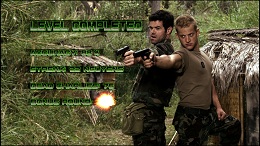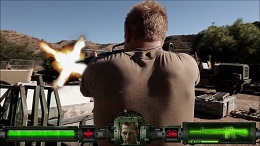 About twenty years ago, Arnold Schwarzenegger took one of his biggest professional beatings when his too-smart-for-its-own-good Last Action Hero came out and landed with a thud heard ‘round the world. The film was about a kid who got magically transported into the latest explosion-porn Schwarzenegger movie, and because of his extensive cinematic knowledge, he knew more about that world than those actually from it. In that picture, although the pre-teen action junky quickly got a handle on the situation, and the ludicrous nature of the universe he’d been transported into, Schwarzenegger’s Jack Slater character was totally oblivious to his existential crisis. Indeed, Jack Slater didn’t actually exist, and every component of his life and the people in it were a series of cinematic clichés deliberately crafted for the masses.
About twenty years ago, Arnold Schwarzenegger took one of his biggest professional beatings when his too-smart-for-its-own-good Last Action Hero came out and landed with a thud heard ‘round the world. The film was about a kid who got magically transported into the latest explosion-porn Schwarzenegger movie, and because of his extensive cinematic knowledge, he knew more about that world than those actually from it. In that picture, although the pre-teen action junky quickly got a handle on the situation, and the ludicrous nature of the universe he’d been transported into, Schwarzenegger’s Jack Slater character was totally oblivious to his existential crisis. Indeed, Jack Slater didn’t actually exist, and every component of his life and the people in it were a series of cinematic clichés deliberately crafted for the masses.
Fast forward a couple decades, and you’ve got what could be considered a thematic cousin of Last Action Hero in director G.J. Echternkamp’s Virtually Heroes. The latter picture, currently playing at this year’s Sundance Film Festival, starts with two soldiers blasting their way through a gaggle of Vietnamese baddies whose deaths come easier than a platoon of the Empire’s greenest stormtroopers. Yet unlike Last Action Hero, there are no out-of-realm visitors to kick the plot off in Virtually Heroes, but instead a very frustrated, fatigued, and self-aware videogame soldier named Brooks (Robert Baker) who laments how many friggin’ times he’s had to play this particular level.
 Brooks’ Player 2 companion is Nova (Brent Chase), an equally self-aware Call of Duty-style soldier playing the level alongside Brooks, yet with far more enthusiasm for the process. While Brooks tries to navigate the level wisely and prudently, Nova plows through the Vietcong bad guys gleefully, ignoring his partner’s advice that the foes they face are “dressed in tan, which means they’re tougher than the ones in black.” This kind of gaming wisdom abounds in Virtually Heroes, where the cast and director seem to have a lot of fun with these kinds of suspended disbelief observations. In another scene, when Brooks is looking for a rocket launcher in his kit bag (easily no bigger than a small purse), he pulls out huge shotguns and rifles that would never fit in so small a satchel.
Brooks’ Player 2 companion is Nova (Brent Chase), an equally self-aware Call of Duty-style soldier playing the level alongside Brooks, yet with far more enthusiasm for the process. While Brooks tries to navigate the level wisely and prudently, Nova plows through the Vietcong bad guys gleefully, ignoring his partner’s advice that the foes they face are “dressed in tan, which means they’re tougher than the ones in black.” This kind of gaming wisdom abounds in Virtually Heroes, where the cast and director seem to have a lot of fun with these kinds of suspended disbelief observations. In another scene, when Brooks is looking for a rocket launcher in his kit bag (easily no bigger than a small purse), he pulls out huge shotguns and rifles that would never fit in so small a satchel.
Yet gamers don’t care about that kind of crap, and neither does Nova, who’s increasingly forced to respond to the complaints of Brooks, a video game character who has about had his fill of war, violence, and shitty cut-scenes that keep stealing the leggy brunette he rescues at the end of each level. This encounter with the hot female character is what drives Brooks to the edge, for in the middle of one particular scene, a bonus level where he and Nova are massacring hundreds of soldiers and civilians alike, Brooks shrugs and wonders aloud “Why are we doing this?” It is the central question of the film, for while the curiously self-aware Brooks wonders about the meaning of it all, and the purpose of his existence, Nova simply answers by shouting “U.S.A.! U.S.A.!”
Creatively, this is pretty much the zenith of the film, however, for what begins as an interesting idea about the existential crisis of a self-aware videogame character never goes much further than this. While Nova joyfully embraces his role as a fictional agent of death and destruction, Brooks digs deeper, and tries to find some meaning or purpose in his existence. Although this leads to a wonderful section of the picture where Mark Hamill makes an appearance as Zen Master Shen Long, the film never tries to peel back the layers of its story and characters.
 How did Brooks become so self-aware? Do the dorky teenager(s) playing the game (who are never shown) know that their characters are experiencing a crisis of faith? How has the whole drama and journey affected Brooks when everything is wrapped up, and what happens to him when and if he actually beats the final boss? Although Brooks stumbles upon this thought at one point in the film, “maybe winning is like being paused forever,” the movie quickly moves past this point. Indeed, it seems like the director was having so much fun making videogame jokes that he didn’t seem too interested in pursuing such thoughtful fare.
How did Brooks become so self-aware? Do the dorky teenager(s) playing the game (who are never shown) know that their characters are experiencing a crisis of faith? How has the whole drama and journey affected Brooks when everything is wrapped up, and what happens to him when and if he actually beats the final boss? Although Brooks stumbles upon this thought at one point in the film, “maybe winning is like being paused forever,” the movie quickly moves past this point. Indeed, it seems like the director was having so much fun making videogame jokes that he didn’t seem too interested in pursuing such thoughtful fare.
And that’s a shame. At least with Last Action Hero, there were a few moments where the film slowed down long enough to weigh the consequences of its fictional world’s realities. In that film, Schwarzenegger lamented the fact that his broken marriage was little more than a throw-away character component arbitrarily inserted into one of the sequels. Arnie also got some time in the real world, where he received a fresh dose of practical living (and pain) when attempting some of the stunts pulled off so effortlessly in his films.
 Virtually Heroes never plows this creative soil too deeply, and instead contents itself with an exploration of what it takes to succeed in a videogame (cheat codes), and the satisfaction of a main character getting a girl and a kiss at the end. In an age when real-world violence and video games are taking center-stage in a larger discussion about American society and politics, G.J. Echternkamp’s picture could have been a humorous lampoon of videogame tradition whilst still saying something about the brutality of that video game setting.
Virtually Heroes never plows this creative soil too deeply, and instead contents itself with an exploration of what it takes to succeed in a videogame (cheat codes), and the satisfaction of a main character getting a girl and a kiss at the end. In an age when real-world violence and video games are taking center-stage in a larger discussion about American society and politics, G.J. Echternkamp’s picture could have been a humorous lampoon of videogame tradition whilst still saying something about the brutality of that video game setting.
Although Last Action Hero didn’t knock the socks off many critics or sociologists when released 20 years ago, it at least had the balls to take the seed of an interesting idea, and develop it into something more than a series of inside jokes. And maybe that’s the problem. When a movie, ANY movie, makes Last Action Hero look like a thoughtful, creative picture, one knows they’re ankle-deep in some pretty shitty water. Proceed with caution.





Comments on this entry are closed.